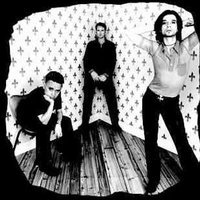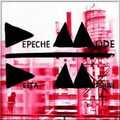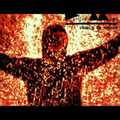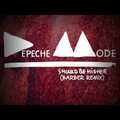 From synthpop teens to experimental pipe bashers, machine-music craftsmen to alternative rock legends, there have been many more ages of DEPECHE MODE than their two line-up changes would suggest. Yet with an indisputably constant appeal, their fan base not only supported these changes, but it somehow fortified and grew.
From synthpop teens to experimental pipe bashers, machine-music craftsmen to alternative rock legends, there have been many more ages of DEPECHE MODE than their two line-up changes would suggest. Yet with an indisputably constant appeal, their fan base not only supported these changes, but it somehow fortified and grew.
These unlikely lads from blue collar Basildon evolved from playing local pubs to global stadiums while leaving a trail of milestones behind them in the form of thirteen evolving studio albums indicating DEPECHE MODE were not really ever a synthpop act but more of an electro-rock band with something to say.
Their most recent studio album ‘Delta Machine’ is the real departure. It harks back to the band’s musical blues influences and minimally produced shows DEPECHE MODE focus on the music and the message first, not the technology where they remain surprisingly ambivalent. On ‘The Child Inside’ sung by Martin Gore, lyrics metaphorically refer to body parts, drowning children and dolls but really explore how life can rob a person of their soul, their inner child. It is, in this regard, classic Mode but it is, like much of what Gore does, easily misunderstood.
 Enormously successful, DEPECHE MODE have topped charts, defined a genre of music and were surprisingly cited as influencers of the Detroit, New York and Chicago techno scenes thanks to extended remixes such as the ‘Combination Mix’ of ‘Get the Balance Right’
Enormously successful, DEPECHE MODE have topped charts, defined a genre of music and were surprisingly cited as influencers of the Detroit, New York and Chicago techno scenes thanks to extended remixes such as the ‘Combination Mix’ of ‘Get the Balance Right’. They were also cited as influencers of other artists despite the indifference of the press at large and have been covered by a wide range of artists from THE SATURDAYS, through JOHNNY CASH and THE CURE to RAMMSTEIN and MARILYN MANSON while acting as an inspiration to respective synth and industrial legends GARY NUMAN and NINE INCH NAILS. This is without spawning acts like MESH, CAMOUFLAGE, DE/VISION and many more.
Regardless of their success and filling the UK’s largest music venues, they receive practically no TV exposure and the average Brit is surprised to hear DEPECHE MODE are still going. It is well documented that DEPECHE MODE have never been too close to the British music industry, typified by their specific, pointed and ongoing exclusion as potential recipients of a ‘Brit Lifetime Achievement’ award without the organisers trying to do it on the quiet.
This quarantine allowed the harsh press criticism to settle into a withering insular knowledge of the band, moving from casual indifference into periodic, often lazy and tired bigotry. Willfully ignorant of DEPECHE MODE’s inherent credibility, the press also disregarded their deep resonance with their fan base, especially in Eastern Bloc territories. Large numbers of Czech, East German, Polish, Hungarian and Romanian youths had gravitated towards the band; these fans had valued their unique sound above that of the pop of the time and realised that Gore covered important real world emotions that questioned the influential communist and religious perspectives in those countries. DEPECHE MODE had provided something incredibly valuable yet a commonly repeated criticism remained Gore’s focus on love faith, death and pain.
 The generally perpetuated and repeated British view remained set in stone from the early 80s, but any blame for this does not rest entirely with the press. Typically for that period, DEPECHE MODE became victims of the fickle music hipsters inevitably falling from fashionable grace. Not helping matters at all, the second album ‘A Broken Frame’
The generally perpetuated and repeated British view remained set in stone from the early 80s, but any blame for this does not rest entirely with the press. Typically for that period, DEPECHE MODE became victims of the fickle music hipsters inevitably falling from fashionable grace. Not helping matters at all, the second album ‘A Broken Frame’ was not only a departure from the immediate synthpop of ‘Speak & Spell’
but was an electronic patchwork of recovery, learning and transition after then main songwriter Vince Clarke moved on. It was neither their strongest work or, bar‘Shouldn’t Have Done That ‘
, an indication of their true direction. But this is where the general British view of the band was forged and any deviation from the gravitational pull of this view has been difficult and temporary.
The press had also always been confused about DEPECHE MODE from the start. The band fell between two stools being neither a guitar act roughing it on an independent label or a well funded pop act with a publicity machine behind them. Then following the addition of Alan Wilder, the third album ‘Construction Time Again’ was released and as a mainly digital experimental affair, it was another departure. Being mentioned in the same breath as SPANDAU BALLET and ABC one year and then DAF and EINSTÜRZENDE NEUBAUTEN the next was bound to confuse. Not forgetting that DEPECHE MODE both used electronics and were anti-guitar, against the backdrop of the previous album’s reception, they were going a little bit further and innovating with real sounds as new textures.
 The resulting building site clangs and concrete thumps were probably too visionary. The band had within a short period changed from Futurist New Romantics to smiling optimisticCasuals and then proposed themselves as Experimenters, pioneering the metal bashing and found sounds of harder European electronic acts into the British mainstream. This led DEPECHE MODE to gradually increase the rate of overseas focus, leaving the UK fan to look to Europe and the US to see the band’s biblical transformations for the next ten years and then, despite the 1995 departure of Alan Wilder and other tensions, DEPECHE MODE’s continued growth.
The resulting building site clangs and concrete thumps were probably too visionary. The band had within a short period changed from Futurist New Romantics to smiling optimisticCasuals and then proposed themselves as Experimenters, pioneering the metal bashing and found sounds of harder European electronic acts into the British mainstream. This led DEPECHE MODE to gradually increase the rate of overseas focus, leaving the UK fan to look to Europe and the US to see the band’s biblical transformations for the next ten years and then, despite the 1995 departure of Alan Wilder and other tensions, DEPECHE MODE’s continued growth.
Wilder’s visionary production skills aside, Gore’s songwriting skill developed further and his ‘Counterfeit’ solo releases consisted of expertly produced cover versions, showing not only his abilities but that his own influences and taste in music were impeccable and very different to the genre of music that he led. Dave Gahan also developed a solo career and a song writing talent to a level where his material was viable for even DEPECHE MODE releases from the 2005 album‘Playing The Angel’.
 Since the post-‘Ultra’ ‘Singles’ Tour when DEPECHE MODE were joined by Christian Eigner on drums and accomplished keyboard player Peter Gordeno, Martin Gore spent more time on stage with a Gretsch guitar than behind a synthesizer. As such, the stage shows have changed beyond even the much evolved lush, dark yet primary ‘Devotional’ tour to the beginnings of what they truly are, one of a rare breed of electronic rock acts, able to span the Kraftwerkian/Zeppelin format gap with credibility, poise and presence. Dave Gahan also shows that he is still one of the most legitimate energetic and expressive god-like frontmen that ever took to the stage, still very much cut from the same cloth as the excess laden devotional period Gahan, except now still vastly experienced but with him, not chemicals, firmly in control.
Since the post-‘Ultra’ ‘Singles’ Tour when DEPECHE MODE were joined by Christian Eigner on drums and accomplished keyboard player Peter Gordeno, Martin Gore spent more time on stage with a Gretsch guitar than behind a synthesizer. As such, the stage shows have changed beyond even the much evolved lush, dark yet primary ‘Devotional’ tour to the beginnings of what they truly are, one of a rare breed of electronic rock acts, able to span the Kraftwerkian/Zeppelin format gap with credibility, poise and presence. Dave Gahan also shows that he is still one of the most legitimate energetic and expressive god-like frontmen that ever took to the stage, still very much cut from the same cloth as the excess laden devotional period Gahan, except now still vastly experienced but with him, not chemicals, firmly in control.
Typically for the genre, your average British music fan remains monumentally unaware of the legacy. It is now understandable for the hardcore fan to view the mainstream as incapable of informed, objective or even unfettered coverage and specialist electronic music media outlets such as Electronic Sound or The Electricity Club as far more reliable with Chi Ming Lai of the latter publication quite rightly describing DEPECHE MODE as “a lifestyle band”. By that, DEPECHE MODE appeal to their global fans on an almost genetic level and have engendered a brand loyalty that the music industry rarely sees. Fans absorbed in the experience of this 30 year journey have worked hard to understand the synergy between the audio and visual elements. They intellectualise the material, the underlying sex, pain, joy, death, life meanings and the process. It became almost spiritual for many.
Fans have grouped into now long established communities, attending overseas gigs together for decades at a time and following this band has led beyond friendships even to several marriages. In 2013, these international clusters of fans are connected to each other through social media. The community is enormous and the dedication religious. Martin Gore and Andy Fletcher again both referred to their dedicated fans as ‘The Black Swarm’, which seems to be as much a phenomena as the band itself.
The DEPECHE MODE community are also capable of informed and objective discussion of the band where it’s due. Fans are unconcerned by the soap-opera of Gahan’s drug problem or rifts between Wilder and Fletcher, instead choosing to discuss commercial releases, choice of producer, out of context remixes, videos, tour set lists, performances and of course, the sometimes inconsistent texture since Alan Wilder’s departure.
For many, this loss has been hard to accept and still, twenty years later, many want Wilder involved again somehow, albeit accepting that DEPECHE MODE with Alan Wilder may be an impossibility given the history, especially considering how the band’s character dynamics played out when Wilder, the motivated goal driven perfectionist juxtaposed with the less driven but project managed approach of the band.
 Another key discussion is Andy Fletcher, who’s infamous friction with Wilder, lack of musical input in the studio and limited live keyboard parts has always been known. This lack of activity is generally accepted by many fans due to Fletcher’s down-to-earth perspective helping give direction and insight; an involvement which quite likely saved the band on many occasions. Complaints and curiosities aside, DEPECHE MODE still lead electronic music outside of dance. They have also released what is an incredibly important album with ‘Delta Machine’ and have embarked upon a tour of exceptional live performances.
Another key discussion is Andy Fletcher, who’s infamous friction with Wilder, lack of musical input in the studio and limited live keyboard parts has always been known. This lack of activity is generally accepted by many fans due to Fletcher’s down-to-earth perspective helping give direction and insight; an involvement which quite likely saved the band on many occasions. Complaints and curiosities aside, DEPECHE MODE still lead electronic music outside of dance. They have also released what is an incredibly important album with ‘Delta Machine’ and have embarked upon a tour of exceptional live performances.
The first UK show of this tour was a much anticipated event amongst the DM community with many having travelled from Sweden, Germany, Switzerland, Austria, France, Portugal, Spain, the US and New Zealand. Covering ‘Delta Machine’ with interesting references back to older album tracks such as ‘Halo’ and ‘Black Celebration’
, DEPECHE MODE’s well known use of film for back projections lived up to expectations. Martin Gore, Dave Gahan and drummer Christian Eigner visibly displayed high degrees of skill and commitment to the show while Peter Gordeno expertly provided keyboard parts and Andy Fletcher was, well, Andy Fletcher. With two back-to-back London shows, over 25% of the show changed for second night. From a fan’s perspective, this made the London shows to be to exactly what was wanted with a brilliant balance of older hits to current album.
 DEPECHE MODE put 63,000 into the Munich Olympiastadion and Dave Gahan very comfortably delivered this massive 2 hour show in weather which varied from borderline bearable to quite dire, handling a restart of ‘Personal Jesus’
DEPECHE MODE put 63,000 into the Munich Olympiastadion and Dave Gahan very comfortably delivered this massive 2 hour show in weather which varied from borderline bearable to quite dire, handling a restart of ‘Personal Jesus’ in joyous and amusing fashion, whipping the masses up in the process. It is true to say that some venues are not suited for live music events. The Berlin Olympiastadion is certainly one of those venues; a big, BIG stadium! Throw in bad weather and the wait becomes a form of endurance and the sound during the gig varies enormously with the blowing wind. But the band came prepared. The financial cost of Dave Gahan getting a cold or throat infection is of course quite extraordinary; so he came to a stage which included 5 very large heaters with a scarf round his neck. The band delivered an exceptional show and everyone forgot about the weather. Of course,‘Never Let Me Down Again’ with so many people doing the arm wave was a sight of biblical proportions that won’t be forgotten in a hurry.
The Mercedes Benz Arena in Stuttgart was a far better venue; smaller in capacity, what was extremely apparent was the warm atmosphere amongst the fans in the ‘Innenraum’. Unlike concerts in the UK, people were concerned with others being able to see and the truly international nature of DEPECHE MODE was very apparent with French, Swiss, German, Hungarian and Austrian fans all in a big party together. The strong atmosphere made this gig a tour favourite with no mistakes bar Andy Fletcher’s comical bass synth solo at the end of ‘Just Can’t Get Enough’. The only gripe was that the setlist had not changed with many of the crowd hoping to hear ‘But Not Tonight’
which had been debuted in Texas at SWXS.
Four days later, the Stade De Suisse in Berne saw a beautiful day and an astonishing gig where Dave Gahan produced what must now be one the best live performances of his career with the possible exception of the better shows of the infamous ‘Devotional’ Tour. Each song wonderfully delivered and even tour plodders such as ‘Precious’
seemed to work exceptionally well. As expected, the Swiss fans were fabulous. It is rare at a concert in the UK or France where you are merely feet from the band, yet still able to dance or stand still without having to guard your place. This was and will remain for many years, a life event. The commonality between these European shows and the two in London was startling; brilliant shows with tens of thousands of people in apparent rapture. The atmosphere was undeniably palpable on all five occasions.
Despite the excellent London shows, three of the four main reviews from the UK press were true to form. DEPECHE MODE remain viewed as unimportant and the fans seen as borderline idiotic. The assessments were bigoted and contained hilarious factual errors such as Martin Gore wearing a leather skirt (which hasn’t happened for a while). This poor treatment may however have been the result of social media trending as any historical discrimination. It would appear far too many reporters would have been in the bar, dreaming up terse witticisms and checking Google for facts on the company smartphone in this age of lazy cut ’n’ paste journalism.
 The ultimate example in creative self-serving fantasy was written by Bernadette McNulty of The Daily Telegraph. To add weight, she included anecdotal dribblings about a fan film no-one ever saw and falsely described the band as an influence on the 80s synth revival. Failing to realise that a band with over 200 songs and 30 years on the road understand a little more about how to put together a widely appealing set list than herself, she criticized it as being not for the “Johnny-come-lately kids”. Had the band chosen differently, she would have doubtless called the show something else. Obviously out of her depth, this journalist fully exposed the short-cut working practices and ignorance of the trade with poorly linked references to Catholicism, German Lutherans and fictional character “Alan Fletcher”. Subsequently any journalist covering a band would do well to consider coming down from their lofty seats and experience the gig for real, especially if they don’t know the band.
The ultimate example in creative self-serving fantasy was written by Bernadette McNulty of The Daily Telegraph. To add weight, she included anecdotal dribblings about a fan film no-one ever saw and falsely described the band as an influence on the 80s synth revival. Failing to realise that a band with over 200 songs and 30 years on the road understand a little more about how to put together a widely appealing set list than herself, she criticized it as being not for the “Johnny-come-lately kids”. Had the band chosen differently, she would have doubtless called the show something else. Obviously out of her depth, this journalist fully exposed the short-cut working practices and ignorance of the trade with poorly linked references to Catholicism, German Lutherans and fictional character “Alan Fletcher”. Subsequently any journalist covering a band would do well to consider coming down from their lofty seats and experience the gig for real, especially if they don’t know the band.
With a band so long in the tooth, the question of relevance is always raised. Clearly to the rest of the world, DEPECHE MODE remain relevant. They influence music, capture the overseas consciousness and sell so many units that the question is almost impertinent. They will always have a place there.
In the UK, given the country’s confusion about DEPECHE MODE, this is not such an easy question to answer. With the ‘Britain’s Got Talent’ world view and a taste for homogenised music rather than evolving bands, you could be forgiven for thinking DEPECHE MODE had had their day some time ago. But if this music industry, with its A&R mechanisms that couldn’t recognise real genius if it walked into the ‘X-Factor’ auditions, then yes DEPECHE MODE are relevant… now more than ever.
The question is no longer “Are DEPECHE MODE relevant in the UK?” but more “Is the UK music scene relevant?”








